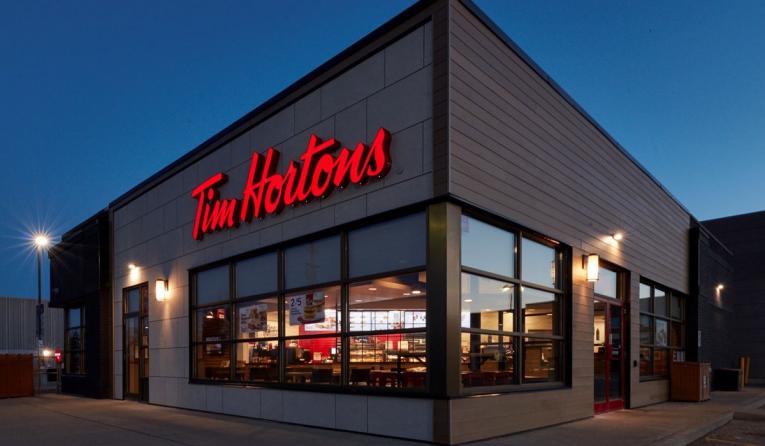Tim Hortons is a Canadian restaurant chain famous for its coffee, donuts, and baked goods. The first-ever Tim Hortons doughnut location opened its doors in Hamilton, Ontario, in 1964. Fast forward to today, Tim Hortons has become one of North America’s largest quick-service restaurant chains with more than 5,000 locations in 14 different countries. I have a lot of relatives that live in Canada and this is a beloved franchise across the country.
What’s the exact cost to open a Tim Hortons in 2024? A total initial investment ranging from $236,500 – $2,137,500 is required to open a Tim Hortons location. The franchise fee is $50,000. Additionally, minimum liquid assets of $500,000 and a minimum net worth of $1,500,000 are required. Take our franchise quiz to find out if Tim Hortons is the right coffee brand for you.
Are you dreaming of buying a franchise of Tim Hortons? In this franchise review, I evaluate the financial requirements, detailed fess, advantages and challenges you may face as an owner.
Page Contents
- Financial Requirements and Fees
- Cost Breakdown
- Other Fees
- Average Sales / Revenue Per Year
- Tim Hortons Franchise Facts
- How Much Profit Does A Tim Hortons Franchisee Make Per Year?
- Advantages of Franchising Tim Hortons
- Established QSR Brand
- Training Support
- Multiple Funding Sources
- Support from Restaurant Brands International
- Charitable Activities
- Challenges of Franchising Tim Hortons
- Previous Lawsuits
- Plastic Pollutant
- Unhealthy Menu
- Regional Awareness
- Is the Tim Hortons Franchise Right For You?
- What’s the cost to open a Tim Hortons in Canada VS the United States?
- How much does it cost to open a Tim Horton’s in the Philippines?
- How much is Tim Hortons worth?
Financial Requirements and Fees
The process of opening a Tim Hortons location begins with understanding the financial requirements and fees involved. I’ve listed the essential franchise costs that might be relevant to you as a prospective franchisee. But before we get started, let me explain the financial terms you’ll need to understand.
- Liquid capital – refers to the entire amount of cash you will need on hand and is available to use at any time.
- Net worth – refers to the value of all your non-financial and financial assets minus the value of all your outstanding liabilities.
- Total investment – is the total capital or the total money you will need to put into the franchise overtime to get it up and running.
- Franchise fee – refers to the amount you must pay to the franchisor to use its brand and resources.
| Fees or Expenses | Financial Amount |
| Liquid Capital | $500,000 |
| Net Worth | $1,500,000 |
| Total Investment | $236,500 – $2,137,500 |
| Franchise Fee | $50,000 |
Potential franchisees can choose to franchise a non-standard/kiosk shop or a standard shop. A franchise fee of $25,000 is required for a non-standard or kiosk shop, while $50,000 is required for a larger-sized coffee shop. The estimated minimum initial investment is $236,500, while the maximum investment can be up to $2,137,500.
Cost Breakdown
Here are the individual elements that comprise the estimated initial investment:
| NAME OF FEE | LOW | HIGH |
| Initial Franchise Fee | $50,000 | $50,000 |
| Real Estate Taxes, Personal Property Taxes, and Common Area Maintenance Charges | $1,000 | $70,000 |
| Equipment | $50,000 | $410,000 |
| Real Estate | Varies | Varies |
| Planning and Development and Design Costs | $15,000 | $100,000 |
| Site Development Costs | $0 | $500,000 |
| Building Costs | $75,000 | $864,000 |
| Training | $20,000 | $27,000 |
| Start-up Supplies and Initial Inventory | $7,000 | $30,000 |
| Professional and License Fees | $1,500 | $10,000 |
| Insurance | $2,000 | $21,500 |
| Security Deposits | $0 | $15,000 |
| Additional Funds | $15,000 | $40,000 |
| ESTIMATED TOTAL* | $236,500 | $2,137,500 |
*The estimated total of $236,500 covers the standard shop within petro locations, while the highest estimated total of $2,137,500 covers the typical shop.
Other Fees
| TYPE OF FEE | AMOUNT/DESCRIPTION |
| Royalty | 4.5% to 6% of gross sales. |
| Advertising Contributions | 4% of gross sales. |
| Interest and Audit Costs | Costs of audit plus interest. |
| Additional Training | Cost to attend additional training such as transportation, food, and lodging, as well as a materials fee. The materials fee will not exceed $1,000. |
| Transfer Fee | 5% of the full purchase price |
| Indemnification | Will vary with circumstances |
| Taxes | Amount imposed on the franchisor by federal, state, and local tax authorities on any fees or other amounts payable by the franchisee to the franchisor. |
| Maintaining Shop Premises in Good Repair | Varies |
| Refurbishing Shop | Varies |
| Lease for Franchised Restaurant Premises | Varies, but between 7% to 8.5% of Gross Sales for a Standard Shop; and up to 13% of Gross Sales for Non-Standard Shops/Kiosks. Must also pay flow through charges such as CAM, insurance, property taxes, and the franchisor’s administrative billing expenses. |
| Reorganization of the Franchisee’s Business | The franchisor’s reasonable legal and administrative expenses incurred in processing changes resulting from the reorganization of the franchisee’s business structure. |
| Smart Store Charges | $450 to $1,050 per month |
| Approving Suppliers Requested by Franchisee | Varies |
| Inspection Costs and Expenses | Varies |
| Products, Supplies, Equipment | Varies |
| Tim Horton Children’s Foundation | Varies |
| Background Check Fee | $280 – $15,000 |
The above information has been compiled from the FDD of Tim Hortons. Year of FDD: 2023.
Average Sales / Revenue Per Year
With more than five-thousand locations all over the world, Tim Hortons is one of the largest Canadian-based quick-service restaurant chains.
During the 2022 financial year, Tim Hortons generated $7.164 billion in global sales.
Not Sure What Franchise to Start? Take Our 7-Minute Franchise Business Quiz!
Tim Hortons Franchise Facts

Tim Hortons is famous for its all-day breakfast meal.
| Total Units: | More than 5,000 |
| Incorporated Name: | Tim Hortons Inc. |
| Franchising Since: | 1964 |
| Industry: | Quick-service restaurants / Fast-food restaurants |
| Subsector: | Donut, Coffee, Baked Goods |
Tim Hortons was founded in 1964 by its namesake, who is a National Hockey League Legend. Its first-ever store opened in Ontario under the name “Tim Horton Donuts” since they only served coffee and donuts at the time. The name was eventually shortened to “Tim Horton’s” and then changed to “Tim Hortons” without the possessive apostrophe.
In 1995, Tim Hortons had a merger with Wendy’s International, Inc. that lasted until 2006. Fast forward to 2014. The chain was once again purchased by a Brazilian company named 3G Capital, known for ownership of the famous fast-food chain Burger King.
Despite being owned by a foreign company, Tim Hortons remains an iconic part of Canadian culture. Today, the restaurant chain is owned by Restaurant Brands International, which is also the parent company of other prominent QSR brands Burger King and Popeyes. As I like to joke, Tim Hortons is essentially the Starbucks of Canada with more than 50% of the locations operating in this northern country.
How Much Profit Does A Tim Hortons Franchisee Make Per Year?
Information on individual franchise owner earnings is not usually disclosed. However, a court case in Ontario has revealed just how much money the average owner of a Hortons’ store makes in a year: $265,558. That’s the income from 170,000 large cups of coffee or about 332,000 frozen donuts sold each year.
During the court battle, the company provided a detailed breakdown of average store profit margins from 2002 through 2008. And the result? Frozen donuts have actually made money for the company. In those seven years, the average Hortons location earned about $1.5 million before the interest and taxes.
You Might Like: How Much Does it Cost to Open a Black Rifle Franchise?
It was observed that profits increased by $174,280 in 2002 to more than $265,000 in 2008. Among the franchise owners, locations in Saskatchewan, Canada were the most profitable. Typical franchise owners in Saskatchewan made more than $396,000 in 2008, up 105 percent from 2002.
As for a more recent update, though Tim Horton’s was not able to siclose their profit numbers for the year 2023, their parent company RBI said that they saw US$364 million in profit in its third quarter for the year.
Advantages of Franchising Tim Hortons

Rewards card for loyal customers of Tim Hortons is now available.
There are all sorts of factors that must be considered before investing in a franchise opportunity. Apart from the cost, financial requirements, and profitability of a business, you should also consider other essential factors such as the availability of training and other qualities of a franchise brand. Let me share some of the competitive advantages of owning a Tim Hortons location.
Established QSR Brand
Due to its focus on quality, freshness, value, great service, and community involvement, it has grown into the largest quick service restaurant chain in Canada specializing in always fresh coffee, baked goods, and homestyle lunches. Tim Hortons had revenue of $3.07 billion U.S. dollars in 2013, making it the world’s second largest coffee company after Starbucks.
Training Support
It’s essential to choose a franchise brand that provides you with support. Tim Hortons does not disappoint in this aspect. As stated on the chain’s official website, they will provide franchise owners training, access to the know-how across all aspects of the business franchise, and built-in support for ongoing operations.
Multiple Funding Sources
Putting up a Tim Hortons franchise is a significant investment, but the good thing is multiple funding sources are readily available for every Tim Hortons franchisee. As an investor, it’s important to assess if the company provides financial assistance programs or funding sources. If you want to purchase a franchise but don’t have the financial means to do so, you may need a dependable financial support program to get a low-cost loan.
Support from Restaurant Brands International
Restaurant Brands International Inc. or RBI is a Canadian-American multinational fast-food holding company. The company owns Tim Hortons, Burger King, and Popeyes, some of the world’s most recognized and iconic quick-service restaurant brands. These independently operated brands have been catering to their respective franchisees for more than 45 years. With a proven umbrella company like this, you can feel more confident that the company will be able to understand and adapt to changing consumer tastes.
Charitable Activities
If you’re an entrepreneur who wants to invest in a company that loves doing charitable and community work, Tim Hortons might be the right brand for you. The chain is involved in various charitable activities, including the Tim Horton Children’s Foundation and the Timbits Minor Sports Program. The foundation was created in memory of Tim Horton in June 1974.
Challenges of Franchising Tim Hortons
While there are many benefits to owning a Tim Hortons franchise, there are also disadvantages to consider before submitting a franchisee application.
Previous Lawsuits
A number of Tim Hortons’ US franchisees filed lawsuits accusing the company of a fraudulent business scheme. A group representing nearly all of the American Tim Hortons franchisees is the Great White North Franchisee Association USA Inc. They sued Tim Hortons and its parent company, Restaurant Brands International, alleging they had engaged in unfair practices by selling them supplies at much higher prices.
Plastic Pollutant
There are a variety of issues concerning the fast-food industry as a whole that Tim Hortons is frequently criticized for. For instance, Tim Hortons’ coffee cups are not recyclable like most other chains. This might be a drawback if you are an entrepreneur who does not like companies that lack environmental initiatives. If recycling and green initiatives is something important to you, evaluate other quick-serve options.
Unhealthy Menu
Due to the high-calorie content of iced coffees and baked goods at Tim Hortons, health care professionals have included the chain in their condemnation of national eating habits. Parents and organizations have also been condemned for rewarding children who participate in sports with treats like Timbits. They see this as counter-productive, as the kids may consume more calories in treats than they burn in the rewarded activities.
Regional Awareness
While Tim Hortons is a global brand there are pockets of the United States where consumers aren’t familiar with the brand. Take for example the South, where you’ll be hard pressed to find a location. My college town of Grand Forks ND (only an hour and a half south of the Canadian border), couldn’t even support a Tim Hortons. The location went out-of-business in less than two years. While this is a proven global brand that continues to grow, you still need to conduct market research to determine if the concept will thrive in your town.
Is the Tim Hortons Franchise Right For You?

The black coffee from Tim Hortons is freshly brewed from coffee beans.
Starting a Tim Hortons can require an investment of more than $2 million depending on the location. When deciding whether or not you should pursue a franchise with Tim Hortons is whether you have the financial means and desire to work the business venture.
Before investing, look inward to consider and assess your experience and interest. Do you have the necessary skills and experience to manage a quick-service restaurant? According to Tim Horton’s official website, “restaurants, coffee shops, retail, or other multi-unit management [experience] is preferred but not mandatory.” Experience is, of course, a plus, but Tim Horton corporate take passion for serving customers into consideration.
Franchise Review: How Much Does It Cost to Open a Dutch Bros?
Lastly, ask yourself whether you are willing to commit full time to run your own location and if you are a passionate leader in business and in the local community. Tim Hortons tends to also look at these qualifications so conduct a thorough self-assessment first and be honest with yourself before filling out the franchise application.
What’s the cost to open a Tim Hortons in Canada VS the United States?
In the United States, a total initial investment ranging from $91,800 to $2,086,500 is required to open a Tim Hortons location. In Canadian currency, the startup cost would be around $114,211 to $2,596,018.
How much does it cost to open a Tim Horton’s in the Philippines?

Two people enjoying their food from Tim Hortons.
If you are interested in starting a Tim Hortons location in the Philippines, it might cost around Php 4,594,323 for a non-standard or kiosk shop, while Php 104,426,969 is required for a big-sized standard shop. Yes, you can franchise this concept in the Philippines too.
How much is Tim Hortons worth?
The founder of Tim Hortons passed away in 1964, but this did not stop the company from expanding long after his passing. Canadian billionaire, Ron Joyce, took over and helped the company beat out McDonald’s as the leading quick-service restaurant chain in Canada. Today, according to Forbes, Tim Hortons’ brand is valued at around $4.5 billion.





